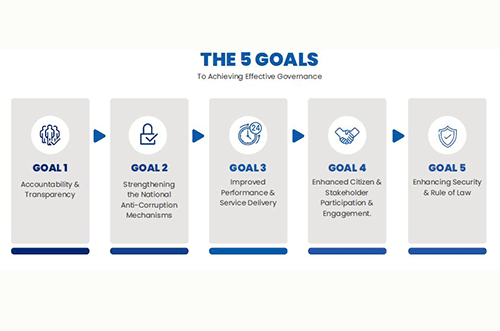The Harambee Prosperity Plan II (HPP II) covers 2021 to 2025 and builds on the solid foundation of the inaugural HPP 2016-2020. It continues to prioritise the implementation of targeted policy programmes to enhance service delivery, contribute to economic recovery and engender inclusive growth. HPPII aims to ensure Namibia is poised to respond to domestic socioeconomic challenges and global opportunities during and after the Covid-19 pandemic.
The formulation of HPPII involved a process of extensive literature review, workshops with subject matter experts and countrywide stakeholder consultations including the 2019 town hall meetings. The baseline for these consultations was the HPP Final Report (2016-2020) and contemporary developmental issues.
The HPPII remains a targeted impact plan, consisting of prioritised short to medium term goals and strategic actions to accelerate national development towards Vision 2030 and Prosperity for All.
The HPPII retains the five pillars:
Pillar 1: Effective governance
Pillar 2: Economic advancement
Pillar 3: Social progression
Pillar 4: Infrastructure development
Pillar 5: International relations and cooperation
The HPP Pillars remain firmly anchored on the construct of an inclusive Namibian House, built on the solid foundation of peace, stability and the rule of law.
Pillar One: Effective governance
According to HPP II, the desired outcome for Pillar One is to strengthen the effective governance architecture in Namibia. This outcome will be achieved through five goals and 23 activities.
Effective governance is described as a critical component for socio-economic development and social cohesion.
It requires robust, accountable and transparent institutions; delivering quality services; protecting people’s freedoms and effectively combatting corruption to build an inclusive society.
Government’s commitment to effective governance is embedded within the Namibian Constitution, Vision 2030, the National Development Plans (NDPs), and commitments in the governing party’s electoral promise and other policy documents.
Significant progress has been made during the HPPI period, demonstrated through the adoption of tailored national policies and peer-rankings on regional and international indices such as the Ibrahim Index of African Governance (IIAG), the Press Freedom Index, the Corruption Perception Index, the 2020 Trace Bribery Risk Matrix and several other indicators. This commitment is further reflected through Namibia’s ratification of regional and international instruments, such as the UN Agenda 2030 (Sustainable Development Goals), AU Agenda 2063 and their attendant Conventions and Charters.
Government is conscious that more should be done and remains committed to implementing and unleashing the full potential of our national policies and development programmes to achieve the desired outcome of an effective governance architecture –which translates into improved livelihoods for all Namibians.
Goal 1: Accountability & transparency will be achieved through:
1. Entrench a culture of structured and accurate reporting across all Public Entities (OMAs, RCs and LAs) and Public Enterprises (PEs) to foster public trust;
2. Adoption and enactment of key policies and legislation to provide comprehensive framework and certainty.
3. Private sector to subscribe to international Environmental, Social and Governance Framework (ESGF);
4. Improve ranking on relevant dimensions of the Ibrahim Index on African Governance (IIAG) from the current Rank No.7;
5. Retain position as the country with the freest press in Africa as measured by Reporters Without Borders.
GOAL 2: Strengthening national anti-corruption mechanisms will be achieved through:
Develop and implement the Second National Anti-Corruption Strategy & Action Plan (2021–2025);
Enhance existing Whistle-Blower and Witness Protection legal and policy framework;
Strengthen institutional capacity of public procurement agencies (expertise and increased oversight);
Institute Public Procurement Performance Assessment Mechanism & publish annually a consolidated performance Report (all Public Entities), and
Improve Namibia’s ranking on the Corruption Perception Index as measured by Transparency International.
GOAL 3: Improved performance & service delivery will be achieved through:
1. Improve the focus of Performance Agreements and Assessment to enhance the efficacy of the Performance Management System;
2. Drive performance of Public Office Bearers (POBs) and senior government officials towards achieving a minimum of 80% of the desired outcomes as stipulated in the PAs;
3. Implement measures to improve innovation and enhance productivity in the public service;
4. Assess the national status of decentralisation, develop and implement a Decentralisation Implementation Plan (DIP);
5. Accelerate the roll-out of key e-governance services at national and regional levels, including functional e-procurement, e-learning, e-health, e-business, social protection and civil registration & identification systems;
6. Encourage the business sector to develop sector-based minimum standards to improve the quality of customer service, measure and publish the Customer Satisfaction Survey Report every second year.
GOAL 4: Enhanced Citizen Participation & Engagement will be achieved through:
1. Institutionalise Civic Townhall Meetings & convene meetings in all fourteen (14) regions every second year;
2. Institutionalise a structured Public-Private Dialogue Mechanism;
3. Develop a Citizen Satisfaction Survey (CSS) Tool, conduct Citizen Satisfaction Surveys once during the HPPII period, and implement Remedial Action Plans based on Survey outcomes, and
4. Provide feedback and avail country review reports by multilateral organisations through public platforms and ministerial websites.
GOAL 5: Enhancing Security & Rule of Law will be achieved through:
1. Strengthen law enforcement nationally;
2. Enhance border patrols and security at all points of entry, and
3. Formulate and implement a coherent modernisation plan for hardware.


